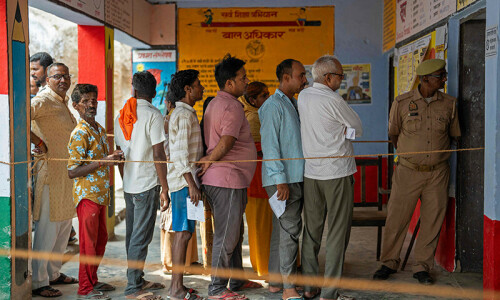UNITED NATONS: Pakistan has again stressed the need for introducing measures for nuclear and missile restraint, like simultaneous application of International Atomic Energy Agency safeguards on nuclear facilities and bilateral arrangement for their reciprocal inspections, to ensure peace and stability in South Asia.
Addressing the United Nations’ first committee which deals with disarmament issues, Pakistan’s Ambassador at the world body in Geneva Tehmina Janjua said her country had made a number of proposals for “keeping South Asia free of nuclear weapons and missiles”.
She recalled that Prime Minister Nawaz Sharif, in his recent address at the UN General Assembly, had expressed Pakistan’s readiness to agree on a bilateral arrangement between Pakistan and India on a nuclear test ban.
“We are awaiting a response to that proposal,” she said. “Our conduct continues to be defined by restraint and responsibility and avoidance of an arms race.”
Ms Janjua said peace and stability in South Asia could not be achieved without resolving underlying disputes, particularly the Kashmir dispute, agreeing on measures for nuclear and missile restraint and instituting conventional forces balance.
“Our proposal for a strategic restraint regime, based on these three inter-locking elements, remains on the table. We have demonstrated our commitment to peace and stability in the region,” she said.
“South Asia’s security environment is blighted by one power’s insistence on hegemonic policies, engaging in a relentless arms build-up and a myopic refusal to engage in any meaningful dialogue on security issues,” Ms Janjua said.
In 1974, she recalled, Pakistan’s security was challenged when India exploded a nuclear weapon. Left with no option, Pakistan had to follow suit to restore strategic stability in the region and deter all forms of aggression.
Discussing disarmament measures at international level, Ambassador Janjua said while progress on nuclear disarmament remained deadlocked, the pursuit of selective non-proliferation measures persisted. After the failure to develop consensus on an equitable and non-discriminatory Fissile Material Cut-off Treaty in the Conference on Disarmament (CD), attempts continued to be made to move the issue outside the conference.
Pakistan, she said, would not accept recommendations by the ill-advised Group of Governmental Experts on the treaty, and substantive work on that matter must be undertaken in the conference.
“Through a series of actions in diverse areas, we have demonstrated our credentials and eligibility to join the Nuclear Suppliers Group (NSG),” the ambassador said. “We expect that a non-discriminatory and criteria-based approach is followed for expanding NSG membership, which will strengthen the non-proliferation regime in an equitable and credible manner.”
She called for addressing regional security issues through dialogue and diplomacy, including establishing a strategic restraint regime in South Asia.
Safe, secure and peaceful use of nuclear energy, without discrimination, was essential for economic development, she said, adding that Pakistan met international standards to gain full access to civil nuclear technology for meeting its growing energy needs for continued economic growth.
Siddhartha Nath, an Indian delegate, exercising the right of reply, said it was a matter of record that Pakistan was responsible for blocking progress in the Conference on Disarmament.
Pakistan’s delegate Yasar Ammar questioned why India had not responded to Islamabad’s proposals for a bilateral nuclear test ban arrangement.
Also, he said, India had joined the Convention on the Prohibition of the Development, Production, Stockpiling and Use of Chemical Weapons and on Their Destruction as a chemical weapon possessor state and had conducted a second nuclear test in 1998 after concluding the Comprehensive Nuclear Test Ban Treaty.
India was also continuously enhancing its offensive abilities, including introduction of nuclear submarines, he said. These actions have compelled Pakistan to take appropriate measures to deter all forms of aggression.
The Indian delegate, taking the floor a second time, claimed that the biggest threat to peace and stability came from active promotion of terrorism and unbridled development of fissile material by state and non-state actors.
He alleged that persistent violations that had increased nuclear and proliferation threats were clearly linked to Pakistan’s activities.
The Pakistani delegate said Mr Nath had chosen to distract the international community from actions of his country. He called upon India to respond to Prime Minister Sharif’s proposal for a bilateral arrangement on a nuclear test ban.
Published in Dawn, October 12th, 2016












































Dear visitor, the comments section is undergoing an overhaul and will return soon.